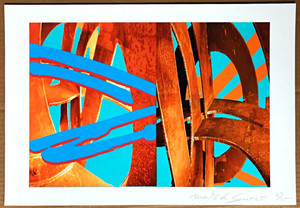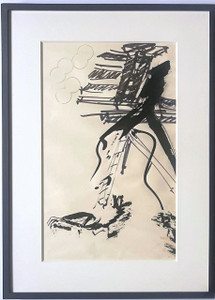
Mark di Suvero, Untitled (LBJ Murderer), from Artists and Writers Protest Against the War in Vietnam, 1967
Mark di SuveroMark di Suvero
Untitled (LBJ Murderer), from Artists and Writers
Protest Against the War in Vietnam, 1967
Lithograph on wove paper with deckled edges
Signed and numbered 22/100 on the front
26 1/5 × 21 inches
Unframed
Lithograph on wove paper
Artists and Writers Protest Against the War in Vietnam
Printed by Hollander Workshop, Inc.; published by Artists and Writers Protest, Inc.
Signed and numbered 22/100 in marker on the front
This vintage mid-1960s lithograph, created during the height of the Vietnam War is Mark di Suvero's contribution to the Artists and Writers Protest Against the War in Vietnam portfolio to raise funds to end America's involvement in Vietnam. It is an invaluable conversation piece and historical artifact for more reasons than one might think... This lithographic rant, in which the artist writes accusatory words about LBJ - calling him a "murderer" with blood on his hands and comparing him to Hitler, seems surprising in several ways, both in terms of the source (artist - read on) and subject matter (Johnson). Regarding the subject, President Johnson has been credited with creating "The Great Society" in the U.S. -- one of the largest series of public welfare programs since FDR. But Johnson also subscribed to the philosophy of 'containment' of communism, so he sharply escalated US involvement in Vietnam. In 1967, Americans' anger against the unelected former Vice President, who became president only after JFK's assassination, because of Johnson's misguided foreign policy, had reached a boiling point, evidenced by di Suvero's raw, angry screed "LBJ: Murderer" which yells, "A criminal is our head of state..be rid of him...impeach him now"....(etc.) When LBJ chose not to try to seek the Democratic nomination in 1968, he defused much of the anger against him, obviating the need for impeachment: "...The conflict in Vietnam, brought him nothing but pain and frustration until his last days in office, and U.S. military involvement in Vietnam continued for four years after his departure from Washington in January 1969...." A Republican (Richard M. Nixon) was elected to succeed Johnson as President of the United States, though Nixon, facing actual impeachment, would ultimately resign in disgrace following the Watergate scandal.











